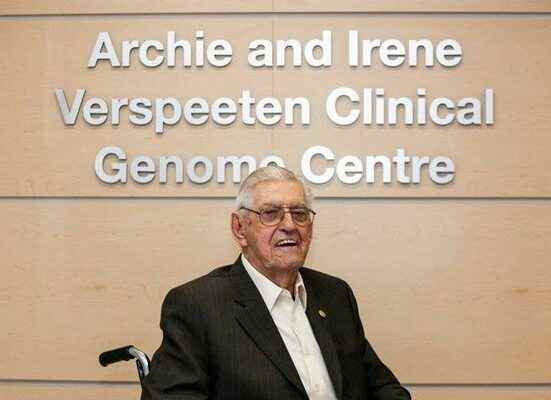A Delhi man is doubling down on a cancer-fighting donation to the London region’s largest hospital — an announcement that came hours after losing his son to cancer.
London Health Sciences Foundation released news of the additional $3-million donation by trucking entrepreneur Archie Verspeeten, founder of Ingersoll-based Verspeeten Cartage, Wednesday morning, the same day his son, Ron Verspeeten, died of the disease.
The family opted to continue with Wednesday’s planned announcement despite Ron’s passing, the hospital foundation said.
The Verspeeten family has felt cancer’s impact deeply. The disease claimed Irene, Archie’s wife of 66 years, in June 2017 and his son, Alan, at age 56 in October 2015.
“The Verspeeten family are pillars of the community. . . It speaks so much to this family as to how they have turned this loss into something positive,” said Stephen Welch, a medical oncologist at London Health Sciences Centre, who got to know the Verspeetens while treating Ron and Irene.
“Their willingness to give back is incredible. It’s an honour, it’s a privilege to be involved.”
The family’s latest contribution builds on $3 million donated by the family in 2020 to found the Archie and Irene Verspeeten Clinical Genome Center at LHSC.
“My wife, Irene, and I know first-hand the cost that can come with a cancer diagnosis. I wish for no family to endure such pain and no patient to experience such suffering. I want nothing more than to end cancer completely,” Archie Verspeeten said in a statement delivered at Wednesday’s news conference.
“I believe this center has already brought us one step closer to better understanding some cancers, but there is still further work to be done. My hope is that our gift can provide time to patients and families when it may be running out.”
The Archie and Irene Verspeeten Clinical Genome Center is meant to help patients with diseases or conditions linked to their genes, with a particular focus on cancer.
Instead of treating every cancer patient with the same therapies, the goal of cancer genomics is to analyze the particular genetic features of a patient’s cancer and use that knowledge to target the disease through proven therapies, off-label use of existing drugs, or clinical trials .
The program already has helped patients in London, said Dan Breadner, a medical oncologist at LHSC.
At Wednesday’s announcement, Breadner spoke about a 66-year-old patient with lung cancer that recurred after chemotherapy. Breadner planned to start the patient on a standard intravenous cancer treatment, but also ordered a cancer genomics test made possible through the Verspeeten centre.
Days before her therapy was to begin, the genetic test results changed her treatment plan and prognosis, he said. “It meant the treatment we had picked wasn’t going to work. . . She is now receiving a safer and more effective therapy. She’s now on a pill that will, on average, add years to her life.”
The additional $3 million from the Verspeeten family will fund resources required to offer genomic testing to patients, said Bekim Sadikovic, the Verspeeten centre’s scientific and clinical director. This kind of genomic testing for research is not covered by OHIP.
The program also requires infrastructure, including specialized equipment and highly trained personnel, he said.
Welch, who’s also involved in the Verspeeten centre, can envision a time when genome-driven personalized care will be the standard for cancer patients in Ontario.
The center is not only showing this method is effective, but also amassing data to prove this type of testing should be funded by Ontario’s public health insurance system in the future, Welch said.
In the meantime, the in-depth genetic analysis offers hope to some cancer patients with a genetic factor in their disease, he said.
